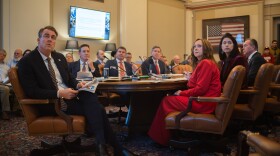Oklahoma legislators have until the end of July to act on gubernatorial vetoes and budget bills in a special session before the session adjourns.
TRANSCRIPT
Dick Pryor: This is Capitol Insider - taking you inside politics, policy and government in Oklahoma. I'm Dick Pryor with Quorum Call publisher Shawn Ashley. Shawn, the legislative special session is set to continue through the end of the month and will automatically adjourn Sine Die on July 31st unless lawmakers extend it. Special sessions have to focus on particular topics. So, remind us what this one is all about.
Shawn Ashley: Lawmakers began the special session back in May. That's when it became obvious that they would be unable to write and pass a fiscal year 2024 budget with enough time left over in regular session to override any gubernatorial vetoes. They called the special session expressly to write that budget as well as finish their appropriation of the American Rescue Plan Act or ARPA funds.
Dick Pryor: Lawmakers passed an FY 2024 budget, which took effect already on July 1st. So why is the special session ongoing?
Shawn Ashley: Well, although not explicitly stated in the call, the session was as much about having time to override any vetoes Governor Stitt might issue for budget bills as it was about passage of the budget itself. In particular, Stitt vetoed two bills that would give Native American tribes with which the state has compacts related to tobacco tax collections and motor vehicle registration an opportunity to extend those compacts through 2024. Now the House overrode Stitt's veto of House Bill 1005X on June 12th. It deals with motor vehicle registrations. The Senate failed by one vote to override Stitt’s veto of Senate Bill 26X on June 26. That's the tobacco tax compact bill. Because that vote failed, the Senate did not take up the House Bill 1005X override.
“We have the votes. We just don't have the votes at the same time,” Senate President Pro Tem Greg Treat said on June 26. “I know of at least four votes,” he said, “that were not here today.” So really what it does is it comes down to scheduling. Senate leaders still need to find a day this month when they can get at least 32 votes to override the vetoes. And the House will then have to find a day after the Senate takes its action, when it would have enough votes to override the Senate Bill 26X veto.
Dick Pryor: So, what happens if they do nothing, they can't schedule anything, and the special session ends?
Shawn Ashley: Well, the bills would have been vetoed and will not take effect. Governor Stitt has reached out to those tribes with an offer to extend the compacts. The offer is similar to what is in the bills, but it does modify the language concerning the locations of tribal tobacco sales to address concerns Stitt has raised regarding the possible impact of the Supreme Court's 2020 decision in the McGirt case and how it might apply to tax questions.
Dick Pryor: State Treasurer Todd Ross has released the state revenue figures for June and the numbers are of concern.
Shawn Ashley: According to Russ’s report, total collections decreased by $38.1 million or 2.5% in June compared to the same month one year ago. Now that decline was driven by a drop in gross production tax collections, which were down $73.1 million or 43.7%. So that means increases in income tax and sales tax collections, for example, made up 35 million of the gross production tax losses. Now, the question is, how long will that continue? The energy industry remains a major contributor to the state's economy and to state tax collections. And if energy tax collections remain depressed, it could begin to drag down other revenue sources and have a negative effect on state collections.
Dick Pryor: Definitely something to watch. The state election board has announced there's a new way for Oklahomans to register to vote, and it's been a long time coming.
Shawn Ashley: That's right. State Election Board Secretary Paul Ziriax announced Tuesday that the state election board has launched its new online voter registration system, which allows individuals to complete and submit a voter registration application electronically. Before now, new voters had to complete paper registration forms. The legislature first authorized online voter registration back in 2015 with the passage of Senate Bill 313. So, it has been a long time in coming. And you can find a link to the online voter registration portal on the state election board website: elections.ok.gov.
Dick Pryor: All right. Thank you, Shawn.
Shawn Ashley: You're very welcome.
Dick Pryor: And that's Capitol Insider. For more information, go to quorumcall.online. You can find audio and transcripts at kgou.org and listen to Capitol Insider where you get your podcasts. Until next time with Shawn Ashley, I'm Dick Pryor.
Announcer: The Pop Culture Happy Hour podcast is with you to talk through what you're watching, listening to and reading, what you need to check out this weekend, what you can skip next. It's all fair game for pop culture in high spirits listen to the Pop Culture Happy Hour podcast from NPR.
Copyright 2023 KGOU. To see more, visit KGOU. 9(MDA4OTAxNzAzMDEzMjc0MTc2MzA5ZDZlMw004))







